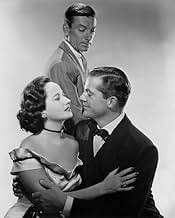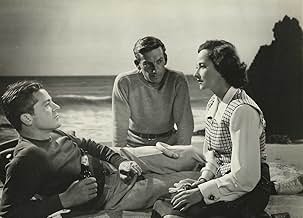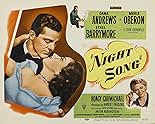IMDb RATING
6.4/10
720
YOUR RATING
When a beautiful socialite falls in love with an embittered composer who is blind, she feigns blindness herself in order to get closer to him.When a beautiful socialite falls in love with an embittered composer who is blind, she feigns blindness herself in order to get closer to him.When a beautiful socialite falls in love with an embittered composer who is blind, she feigns blindness herself in order to get closer to him.
- Awards
- 4 wins total
Whit Bissell
- Party Guest
- (uncredited)
Leonard Bremen
- Chez Mamie Headwaiter
- (uncredited)
Charles Cirillo
- Sailor at Chez Mamie
- (uncredited)
Angela Clarke
- Woman
- (uncredited)
George Cooper
- Bellboy
- (uncredited)
Lynn Craft
- Party Guest
- (uncredited)
Suzi Crandall
- Fur-Coated Pedestrian
- (uncredited)
Herbert Evans
- Butler
- (uncredited)
Featured reviews
If you ask me, this film seems undervalued or under-appreciated. I don't know why. RKO's NIGHT SONG stars Dana Andrews as a blind pianist and Merle Oberon as the woman who loves him. The music is wonderful, and while the plot is full of melodramatic complications and a liberal amount of hokum, it still manages to entertain and engage the audience because the characters are well-drawn and well played. The film boasts the added bonus of having Ethel Barrymore and Hoagy Carmichael in the supporting roles.
In some ways, NIGHT SONG reminds me of MAGNIFICENT OBSESSION, where Irene Dunne (or Jane Wyman, take your pick) experiences blindness and manages to find love in an unlikely source.
While not considered an 'essential' (in the TCM sense of the word), NIGHT SONG is a studio film that is very well put together and succeeds on many levels.
In some ways, NIGHT SONG reminds me of MAGNIFICENT OBSESSION, where Irene Dunne (or Jane Wyman, take your pick) experiences blindness and manages to find love in an unlikely source.
While not considered an 'essential' (in the TCM sense of the word), NIGHT SONG is a studio film that is very well put together and succeeds on many levels.
They used to show it on Turner Classic Movies on Ethel Barrymore's birthday (when they would show all of her movies). It contains a wonderful original mini-concerto by film composer, Leith Stevens, written just for this film. I think this movie is wonderful, in part, because it really exemplifies the best sort of films that glamorize classical music and not only give the film-goer a glimpse into the life and excitement of being a musician, but a peak into the collaborative creative process, itself. Many of these films were made in the '30s, '40s and '50s. They are rarely made now; usually films about musicians, especially about classical musicians, alienate the audience from the artists rather than inspiring empathy and a desire to emulate the stars on screen. Also, such clever and moving plots in love stories are fairly rare now. Ironically, it has wonderful scenes where Hoagy Carmichael takes dictation for the blind composer but in real life, Hoagy Carmichael, one of the great jazz musicians of the 20th Century, could not read music. I wonder if the plot was inspired at all by the fate of the '20s Jazz Great, Bix Beiderbeck, who drank himself to death at a young age because he found it increasingly hard to get work in the Paul Whiteman-inspired era of big bands who played from written parts. It also has some wonderful quotable one-liners and great, even profound dialogue, I wish it were available. That a film with such a star-studded line-up should be completely out of print is astounding: Dana Andrews, Merle Oberon, Hoagy Carmichael, Ethel Barrymore, the great pianist, Arthur Rubenstein (who even has a couple of lines), the great Conductor, Eugene Ormandy, and the New York Philharmonic, as it was at its peak at the end of the '40s. There is a lot that is original in this film. For example, The scene in which Dana Andrews gives Merle Oberon a piano lesson is an amazing look at what brilliant interpretation based on musical maturity and advanced education can accomplish. Merle Oberon plays Chopin perfectly but mechanically, and then Dana Andrews plays it perfectly but brings it to life. We hear it from the kitchen along with Carmichael and Barrymore. She tells him archly that she doubts there is much he could teach her, as we hear it the first time together with them, and the second time, he tells her, matching her archness, exactly, "looks like she is improving already." One can neither rent nor buy Night Song. I wonder if it was issued on VHS. I just saw that a 16 mm copy went at auction for several hundred dollars on E-Bay. Pity.
For those who did not live in the 40s, this film may appear to be soap-operish. However, one must remember that 60 years of Real and TV soap opera have drastically diminished its impact, leaving us with a feeling that we have seen it all before - forgetting that it was the "first". A blind musician, a wealthy socialite, an "all-knowing" aunt, a musical friend, Rubinstein and Ormandy - what a confection! And the "glue" that holds it all together is the music. After all, it IS "Night Song". Other reviewers have been rather harsh in their criticism of Leith Stevens' concerto. It should be noted that it has been recorded along with other film piano concertos on ELAN CD (Piano in Hollywood)and represents - along with the output of so many others - the greatest "American" symphonic music of the 20th century. Film music never gets its proper due. Whatever "romanticism" in this movie appears far fetched, it's no less plausible than the current crop of "action" films. For those who prefer clanging and banging, this "song" is not for you!
The third of three films featuring Dana Andrews and musician Hoagy Carmichael, and this time, Andrews, instead of being a frontiersman/entrepreneur or a war veteran bombardier to Carmichael's mandolin and then piano playing, progressively-minded moral conscious... like in CANYON PASSAGE and THE BEST YEARS OF OUR LIVES... Dana's a musician too: a blind pianist and ticked off about it, working for and living with Carmichael's jazz club manager, Chick, who winds up in cahoots with lovely rich girl Merle Oberon...
The best scenes happen early when she first meets Andrews at the nightclub with her stuffy friends in tow and he, between jazz sets, is playing a smoky classical composition only she seems to hear, and then pretends to "run into him" first at the beach, and then meeting up for lessons: all the while pretending to be blind. And she's got her own insightful advise-giving friend in Ethel Barrymore.
As for Dana Andrews, the performance is realistic enough throughout the first half that the happy-sappy second part, leading to what would now be considered a Hallmark Channel conclusion, is actually quite welcomed: Being such a genuinely grouchy, hateful jerk without sight, you'll hope he's cured just to give the poor little rich, smitten girl a break...
Who's painted herself into more corners by pretending to be someone else, again: After which NIGHT SONG plays out like a biopic of a famous composer, which it's not. And in one scene, when Dana tells Hoagy's he's a mediocre musician, well... that took some good acting on Dana's part, who, just the year before, was getting "stinking at Butches" (Hoagy's joint) along with Frederic March and Harold Russell.
The best scenes happen early when she first meets Andrews at the nightclub with her stuffy friends in tow and he, between jazz sets, is playing a smoky classical composition only she seems to hear, and then pretends to "run into him" first at the beach, and then meeting up for lessons: all the while pretending to be blind. And she's got her own insightful advise-giving friend in Ethel Barrymore.
As for Dana Andrews, the performance is realistic enough throughout the first half that the happy-sappy second part, leading to what would now be considered a Hallmark Channel conclusion, is actually quite welcomed: Being such a genuinely grouchy, hateful jerk without sight, you'll hope he's cured just to give the poor little rich, smitten girl a break...
Who's painted herself into more corners by pretending to be someone else, again: After which NIGHT SONG plays out like a biopic of a famous composer, which it's not. And in one scene, when Dana tells Hoagy's he's a mediocre musician, well... that took some good acting on Dana's part, who, just the year before, was getting "stinking at Butches" (Hoagy's joint) along with Frederic March and Harold Russell.
NIGHT SONG might only appear to be a routine example of the kind of postwar romance that most of the major studios produced. A blind bar pianist (Dana Andrews) is taken up by a wealthy socialite (Merle Oberon), who pretends to be blind herself in order to secure his confidence. After a courtship in San Francisco, the pianist is given sufficient financial backing to have an operation to restore his sight, and receive a concert premiere of his new concerto at Carnegie Hall, New York. He returns to San Francisco, where he meets his beloved, and the two them vow eternal love.
Frank Renton and Dick Irving Hyland's screenplay contains its fair share of intertexts. The idea of a concert performance dates back to Brian Desmond Hurst's huge British wartime hit DANGEROUS MOONLIGHT (1941), that contained the premiere of Addinsell's "Warsaw Concerto," while Andrews's predicament as a war-scarred survivor cross- references Goldwyn's THE BEST YEARS OF OUR LIVES (1946), in which the actor had given an equally memorable characterization in a similar role.
Yet nonetheless NIGHT SONG possesses a certain integrity. Director John Cromwell establishes a close bond between Andrews and his boon companion Chick (Hoagy Carmichael, who even gets a solo number), and by doing so suggests the importance of male bonding in an often uncertain world. No one, it seems, knows really what to do with the peace, after having won the war; the only outlet both men can find is playing bands in some cheap SF dive bars.
This relationship is contrasted with the more spiky friendship between Oberon and her boon companion Miss Willey (Ethel Barrymore). The grande dame of the American theater gives one of her more commanding characterizations as a supposed cynic with a heart of gold, who readily understands the agonies her younger friend experiences as she tries to woo the pianist without hurting his feelings. In an environment where people seldom gave vent to their emotions in public, emotional expression is put at a premium.
The end of the movie is enlivened by a live performance from Leopold Stokowski and Eugeme Ormandy playing themselves with the New York Philharmonic Orchestra. They do not have to do much, but they set about delivering the concerto (with music by Leith Stevens) with a conviction and gusto that is truly refreshing.
Frank Renton and Dick Irving Hyland's screenplay contains its fair share of intertexts. The idea of a concert performance dates back to Brian Desmond Hurst's huge British wartime hit DANGEROUS MOONLIGHT (1941), that contained the premiere of Addinsell's "Warsaw Concerto," while Andrews's predicament as a war-scarred survivor cross- references Goldwyn's THE BEST YEARS OF OUR LIVES (1946), in which the actor had given an equally memorable characterization in a similar role.
Yet nonetheless NIGHT SONG possesses a certain integrity. Director John Cromwell establishes a close bond between Andrews and his boon companion Chick (Hoagy Carmichael, who even gets a solo number), and by doing so suggests the importance of male bonding in an often uncertain world. No one, it seems, knows really what to do with the peace, after having won the war; the only outlet both men can find is playing bands in some cheap SF dive bars.
This relationship is contrasted with the more spiky friendship between Oberon and her boon companion Miss Willey (Ethel Barrymore). The grande dame of the American theater gives one of her more commanding characterizations as a supposed cynic with a heart of gold, who readily understands the agonies her younger friend experiences as she tries to woo the pianist without hurting his feelings. In an environment where people seldom gave vent to their emotions in public, emotional expression is put at a premium.
The end of the movie is enlivened by a live performance from Leopold Stokowski and Eugeme Ormandy playing themselves with the New York Philharmonic Orchestra. They do not have to do much, but they set about delivering the concerto (with music by Leith Stevens) with a conviction and gusto that is truly refreshing.
Did you know
- TriviaDana Andrews wore opaque contact lenses throughout filming to give him a realistic sensation of blindness.
- GoofsWhen Chick begins singing the verses on the song "Who Kill Er", you hear horn riffs playing in the background. But when it cuts to the horn players on stage, they are sitting still and not playing although you can hear the horns in the music.
- Quotes
Miss Willey: My heart's an old wastepaper basket, filled with unpaid bills and paperback novels.
- ConnectionsFeatured in Let's Go to the Movies (1949)
- SoundtracksI COULDN'T SLEEP A WINK LAST NIGHT
(uncredited)
from Amour et swing (1943)
Music by Jimmy McHugh
Performed by "Chick Morgan Band"
- How long is Night Song?Powered by Alexa
Details
- Release date
- Country of origin
- Language
- Also known as
- Mi corazón te guía
- Filming locations
- Broad Beach, Malibu, California, USA(aka Trancas Beach - beach scenes)
- Production companies
- See more company credits at IMDbPro
Box office
- Gross US & Canada
- $1,700,000
- Runtime
- 1h 42m(102 min)
- Color
- Aspect ratio
- 1.37 : 1
Contribute to this page
Suggest an edit or add missing content



































